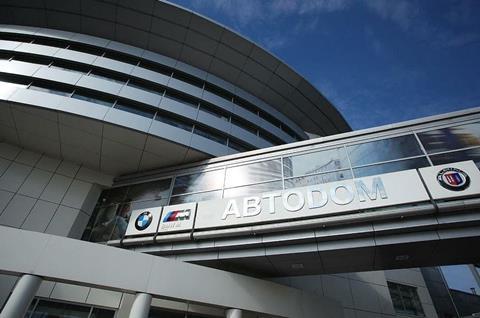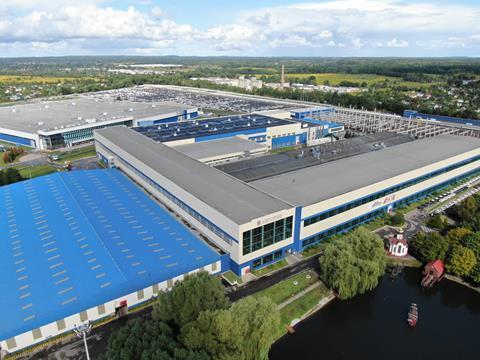[ad_1]
Russia has struggled to supply the quantity of parts wanted to proceed manufacturing from nations corresponding to China or Turkey, or by means of parallel import schemes, as sanctions proceed to chew.

Final week Mercedes-Benz and Ford introduced grew to become the most recent carmakers to announce they had been ending their enterprise connections in Russia, becoming a member of a rising variety of automotive firms exiting the nation since Russia invaded Ukraine.
Mercedes-Benz introduced it was promoting its industrial and monetary companies subsidiaries to Avtodom, a Russian auto dealership chain. Ford additionally stated it had finalised the exit of its beforehand suspended operations in Russia by means of the sale of its 49% share within the Sollers-Ford three way partnership. Each carmakers suspended manufacturing again in March this 12 months after Russia’s invasion of its neighbour.
In September, Toyota and Nissan additionally ended their relationships with the Russian market, promoting their stakes in native branches.
A supply within the Russian automotive business, who wished to stay nameless, stated Russian authorities had been turning to EV manufacturing after realising there isn’t a manner home producers of internal-combustion engine (ICE) autos can breathe life again into the growing variety of shuttered automotive vegetation.
“The Business and Commerce Ministry estimated that establishing EV manufacturing is simpler than localising typical automobile meeting,” stated the supply. “It takes fewer parts and this market is much less aggressive to date.”
The supply added that regardless of having some rationale behind it, the plan is predicated on populism and “doomed for failure”. In 2021 Russia offered 2,200 EVs.
Rosatom and Avotor
Regardless of that unfavourable prediction there have been a raft of formidable manufacturing bulletins of late.
On October 14, Russian state-owned firm Rosatom stated it had began building on Russia’s first plant for the manufacturing of lithium-ion batteries. The funding within the facility is reported to be near 26 billion roubles ($450m).
The battery plant will start with put in annual capability for 50,000 batteries, with the potential to ramp up output to between 120,000-130,000 models per 12 months.
Albert Karimov, Russia’s deputy minister for commerce and business, stated that Kaliningrad-based Avtotor is seen as the important thing buyer for the Rosatom plant.
In September 2022, Avtotor introduced plans to speculate 32 billion roubles ($550m) in establishing infrastructure for EV manufacturing in Russia, together with constructing a number of electrical engine factories. The corporate plans to transform some manufacturing capacities to launch the primary EVs in 2023.
The announcement adopted Avtotor being compelled to droop the meeting of BMW autos when the German carmaker pulled out of the Russian market in March. In September, it was additionally compelled to cease contract manufacturing of Hyundai and Kia autos when it ran out of meeting kits and automotive parts, the provision of which had stopped just a few months earlier.
In 2021, Avtotor produced 177,000 completed autos, 13% up from the earlier 12 months. Investing in automobile manufacturing to get anyplace close to that determine now’s seen as a strategic job on a nationwide scale, in response to Alexander Sokolov, basic director of Avtotor.

Sokolov stated securing unbiased automobile manufacturing was a vital endeavor within the present political atmosphere. “From this standpoint, growing EVs and the manufacturing of our personal parts is of the utmost significance,” he stated.
Evolute and Moskvitch
Motor-Make investments has additionally launched manufacturing of EVs below the Evolute model within the western Lipetsk area of Russia. By the tip of the 12 months, Motor-Make investments plans to ship the iJoy crossover and the iVan minivan on the market. In complete, by the tip of the 12 months, the corporate intends to supply 2,000 EVs and to develop that within the new 12 months.
As well as, Moscow Metropolis plans to launch EV manufacturing below the outdated Soviet model Moskvitch, alongside ICE production, on the former Renault plant in Moscow, which was nationalised in Might when Renault reduce ties with the plant and offered all of its shares to Moscow Metropolis. Plans to make ICE autos there below that model seem to have failed.
Dmitry Pronin, the brand new basic director of the plant, disclosed that in 2023 it might manufacture 50,000 autos, together with 10,000 EVs. In 2024, these figures are set to develop to 100,000 and 20,000, respectively.
Binary market
Regardless of these plans, the Russian information outlet Avtovzglyad, citing a number of market analysts, lately reported that Russian automotive vegetation are prone to crumble, as nationwide demand slumps to 600,000 autos from 1.6m in 2021. In 2023, gross sales are projected to bounce again barely to 650,000 models.
Assuming that every one overseas carmakers, besides the Chinese language-owned manufacturers, will finally sever their ties with Russia, as many as ten ownerless automobile vegetation will stay within the nation. In response to the analysts cited by Avtovzglyad, these vegetation may solely hope to compete for manufacturing of 150,000 models a 12 months, and “no sane businessman, even from pleasant China, would spend money on localising any manufacturing in Russia below these circumstances.”
“For a while, all these factories will stand idle and even flip into warehouses, or they are going to be stupidly plundered and we are going to solely be left with [Russian carmakers] Avtovaz and UAZ,” stated Avtovzglyad.
[ad_2]
Source link


